April 3, 2025 | 09:36 GMT +7
April 3, 2025 | 09:36 GMT +7
Hotline: 0913.378.918
April 3, 2025 | 09:36 GMT +7
Hotline: 0913.378.918
Mr. Le Tho recently uprooted 1 hectare of dragon fruit in An Phu village, Ham Chinh commune, Ham Thuan Bac district (Binh Thuan). This is comparable to 1,000 dragon fruit pillars.
He stated that the ten-year-old dragon fruit garden produced an ever-decreasing amount of fruit, eventually leading to its destruction. While the cost of fertilizer and pesticides continues to rise, the items are sold dirt cheap, for just a few thousand dongs per kilogram, resulting in a massive loss for him.
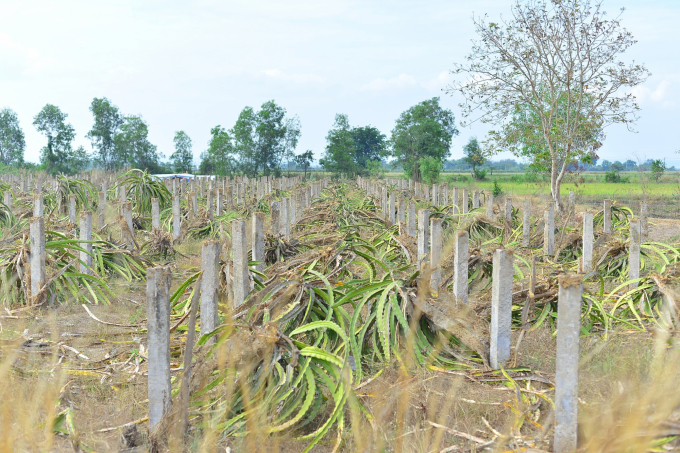
Farmers in Binh Thuan uprooted dragon fruit trees, mainly in old gardens, with low productivity. Photo: KS.
"My family has lost interest in dragon fruit as a result of its high input costs and unstable production. As a result, we chose to remove the dragon fruit trees and replace them with grass for cows and guava," Mr. Tho explained, adding that his decision was followed by many other agricultural households.
Dragon fruit plants were destroyed in a series of gardens in village 5 of Ham Lien commune, Ham Thuan Bac district.
Mr. Nguyen Tanh, a dragon fruit farmer in village 5, estimated that one-third of the community's area has been destroyed to clear the way for other trees or to leave the land available for leasing. However, farmers continue to maintain dragon fruit gardens that are new, badly restored, and high-yielded, while destroying others that are old, poorly restored, and yield low.
The destruction of dragon fruit in village 5, Ham Chinh commune, is also a result of the fact that gardeners have consistently lost money in the past since the investment cost of fertilizer has climbed while the yield of goods has remained uncertain. The price of dragon fruit in mid-March 2022 is extremely low, and wholesale is no longer of interest to traders. Traders may only acquire around 1 ton of fruit for around VND 1 million or several hundred thousand dong.
While several farmers in the area destroyed the dragon fruit, Mr. Nguyen Tanh maintained the garden because he calculated that it would take at least 3-5 years to harvest the dragon fruit if he converted to another plantation.
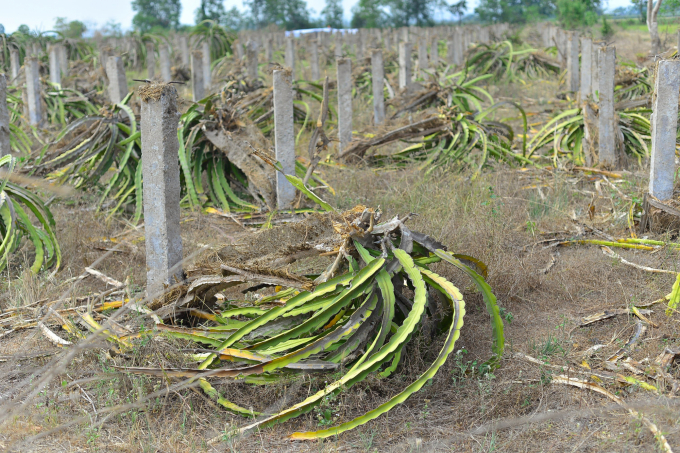
In Ham Thuan Bac district, many areas of dragon fruit have been destroyed by farmers to switch to other crops. Photo: KS.
According to the Ham Thuan Bac Department of Agriculture and Rural Development, the district's dragon fruit area would have dropped by more than 1,400 hectares by the end of December 2021. Currently, the district's total dragon fruit area is over 7,923 hectares.
And Mr. Nguyen Van Phuc, Vice Chairman of the Ham Thuan Nam district's People's Committee, stated that there are few cases of dragon fruit destruction in the area at the moment. However, when it comes to rental dragon fruit gardens, individuals frequently transfer and trade land. However, many gardens continue to water dragon fruit trees sparingly rather than destroying them, despite the fruit's poor price.
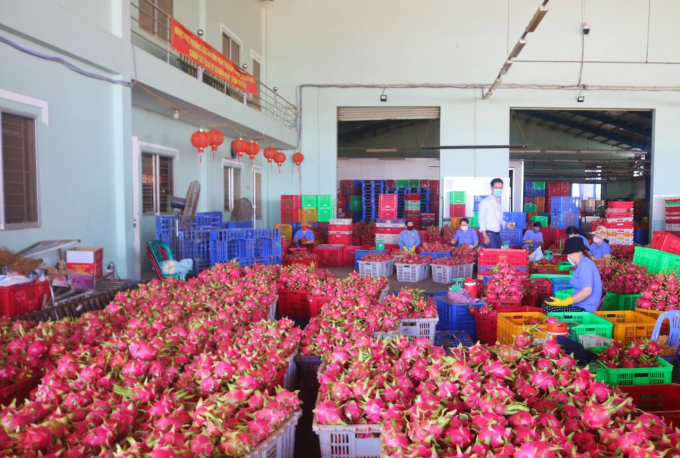
Binh Thuan dragon fruit is mainly exported to the Chinese market. Photo: KS.
Binh Thuan has sent a letter to departments and villages requesting that they adopt a series of measures aimed at increasing agricultural consumption. The provincial People's Committee directed the Department of Agriculture and Rural Development to chair and collaborate with district, commune, and municipal authorities to examine the scale and situation of agricultural production and processing in the province; to continuously update information on agricultural output and prices in each period to develop plans to support the connection of production, processing, and consumption.
Additionally, the agricultural unit must work with the Department of Industry and Trade regularly to monitor and update information on agricultural product consumption (particularly for dragon fruit); Congestion and backlogs at northern border gates to inform individuals and companies promptly, enabling them to build proactive production and business strategies. Promote manufacturing following VietGAP, GlobalGAP, and organic standards, among others, to fulfill the regulatory requirements of the import market (especially for dragon fruit).
Simultaneously, the unit is required to develop concentrated and sustainable agricultural raw materials and commodities, ensuring quality for export, consumption, and processing; strengthen food quality and safety management; and ensure strict control of the situation regarding the use of chemicals, stimulants, and pesticide residues on agricultural products.
Concurrently, it must implement the issuance and strict management of the code of the growing area, the code of the farming area, and the code of the packer; strengthening instructions for individuals and businesses to standardize quality by VietGAP, GlobalGAP, and organic standards, among others, to comply with import market regulations.
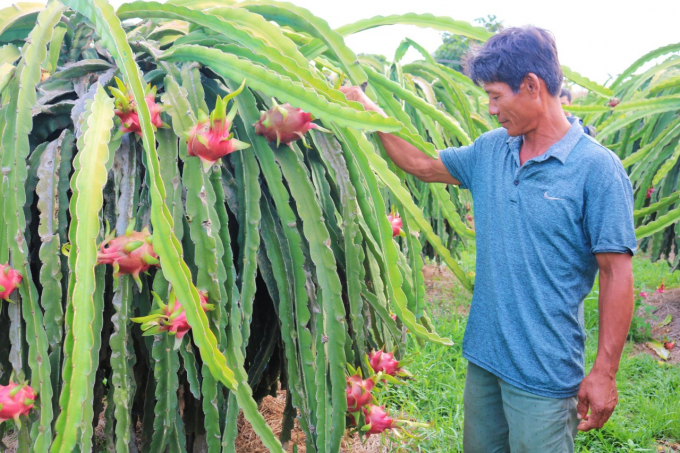
Binh Thuan has 33,000 hectares for dragon fruit cultivation. Photo: KS.
Recommending farmers not to eliminate dragon fruit
Me. Do Van Bao, head of the province Sub-department of Crop Production and Plant Protection in Binh Thuan, urged that farmers refrain from felling dragon fruit trees. The reduced price is just for a limited period. China's market will not abandon Binh Thuan dragon fruit, as their enterprises are directly tied to dragon fruit production; consequently, in the face of low dragon fruit prices and loss, the Sub-Department recommends that farmers temporarily halt intensive farming but maintain dragon fruit gardens.
In terms of farming practices, farmers must at the very least mow the grass, water, and use organic fertilizers sparingly (processed organic fertilizers) to maintain the garden blooming and green, and to avoid the garden failing, falling branches, and shrinking branches. Only then will we be able to provide the best conditions for standard production when the price of dragon fruit recovers.
Mr. Nguyen Van Phuc, Vice Chairman of the Ham Thuan Nam District People's Committee, stated that while the area of dragon fruit in the district is over 15,000 hectares, he believes that if the area is limited to approximately 10,000 hectares or less, the dragon fruit would thrive. With the district's future in mind, the district's agriculture sector will be restructured in accordance with market demand.
Translated by Linh Linh
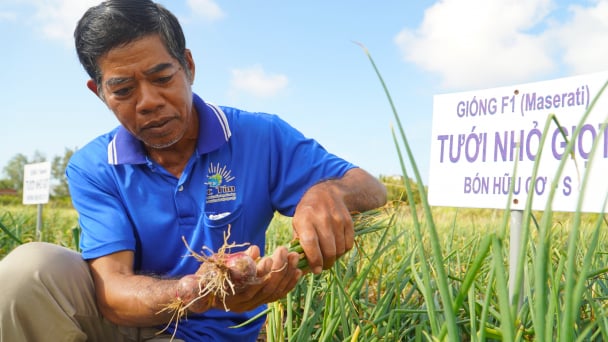
(VAN) In the face of the reduction of underground water source, farmers from Vinh Chau desire to transform to the drip irrigation methods to save water, reduce costs and enhance crop output.
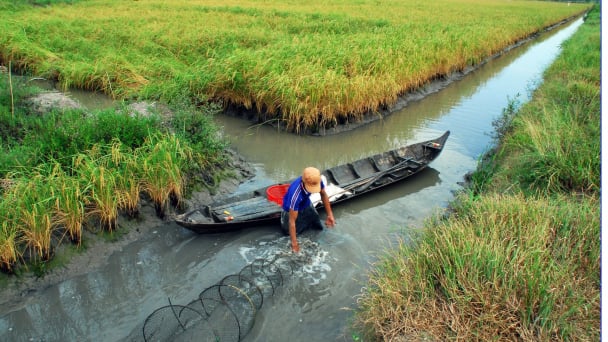
(VAN) Green development is a prerequisite for the Vietnamese shrimp industry to maintain its position in the global market by applying advanced technologies and effectively controlling diseases.
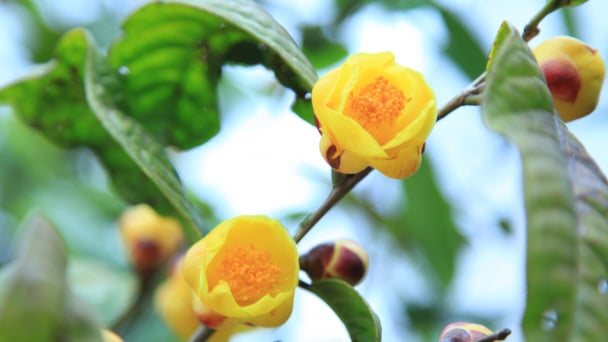
(VAN) Quang Ninh province's Ba Che yellow camellia tea is a highly regarded specialty that has been officially designated as a national 5-star OCOP (One Commune One Product) product.
/2025/03/27/5827-2-125018_139.jpg)
(VAN) Thanh Thanh Cong-Bien Hoa Joint Stock Company (TTC AgriS) signed a memorandum of understanding (MOU) with Nanyang Technological University (NTU) under the witness of the two Prime Ministers of Vietnam and Singapore.
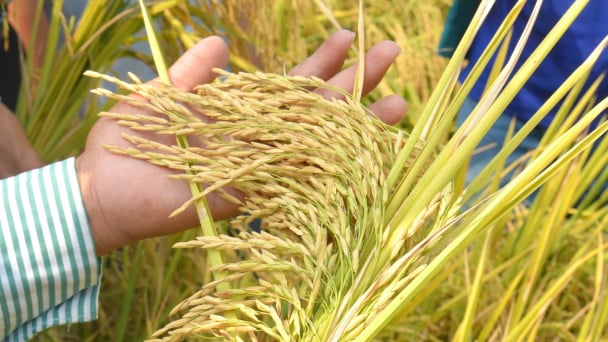
(VAN) In the first trial production season, the pure rice variety Ngoc Nuong 9 demonstrated its advantages of easy cultivation, high yield, and a profit of over 45 million VND/ha.
/2025/03/26/5733-6-145223_956.jpg)
(VAN) Japan Vietnam Fertilizer Company is one of the pioneering fertilizer companies in the use and application of agricultural drones in sustainable agricultural cultivation.

(VAN) Adoption of artificial intelligence (AI) has fostered the hydrometeorology sector in increasing significantly the accuracy in forecasting and early warning of natural disaster risks.